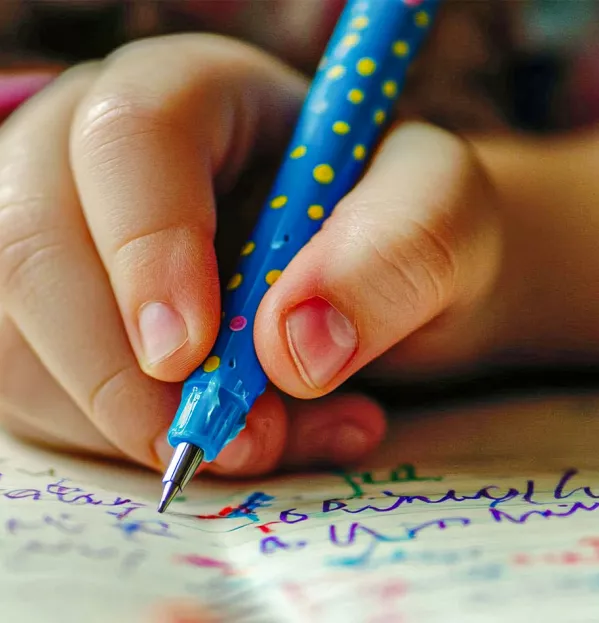
- Home
- Teaching & Learning
- General
- DCD: the common SEND youŌĆÖve probably never heard of
DCD: the common SEND youŌĆÖve probably never heard of

Developmental coordination disorder (DCD) has such an awareness problem that you might not have heard of it.
What you probably have heard of, though, is dyspraxia. And, as Judith Gentle, a senior lecturer in psychology at the University of Surrey explains, .
This confusion over the terminology is an endless source of exasperation to her. ŌĆ£As a researcher and the parent of a child with DCD, who wants to raise awareness, itŌĆÖs really frustrating that weŌĆÖve got two names,ŌĆØ Gentle says.
The confusion stems from the fact that while dyspraxia does not have diagnostic criteria, DCD does. Research therefore tends to use the term DCD, while out in the ŌĆ£real worldŌĆØ of schools and occupational therapy, the condition is more commonly known as dyspraxia.
ŌĆ£ItŌĆÖs really important that [clarification] is shared, because researchers are often talking about DCD and people think, ŌĆśWell, thatŌĆÖs nothing to do with me,ŌĆÖ when actually weŌĆÖre talking about the same thing,ŌĆØ Gentle says.
Understanding DCD
DCD is a condition that affects physical coordination: either your fine or gross motor skills, or both. It causes children to perform less well than expected for their age in activities such as writing, and they may also appear to move in a less coordinated manner.
ItŌĆÖs also very common, being just as prevalent in the population as ADHD (both have an incidence of around 5 per cent) - though it receives far less attention.
So, whatŌĆÖs behind this lack of awareness, besides the confusion over the terminology? And what do teachers need to understand about how DCD affects learning? We spoke to Gentle to find out more.
Tes: What are fine and gross motor skills and how do they develop?
Judith Gentle: Fine motor skills refer to the coordination of the smaller muscles in our hands and fingers. They are essential for doing things like holding a pen, dressing or feeding ourselves. They tend to develop after the gross motor skills, which involve large movements of the whole body, including crawling, walking and moving the arms, legs and torso.┬Ā
For example, when youŌĆÖre a baby, you develop control over your head and torso first. ThatŌĆÖs followed by being able to move your arms and legs, as you develop and strengthen the muscles. You then start to refine movements to include fine motor skills, which allows you to use your fingers to grasp and hold on to items. After that, thereŌĆÖs usually lots of motivation to start feeding yourself and use utensils like cutlery.
In a school environment, fine motor skills become even more critical. We use them for writing, cutting with scissors and for things like tying your shoelaces. TheyŌĆÖre really important skills.
If a child struggles with their motor skills, how might that affect them in school?
If you struggle to form letters or hold a pencil, itŌĆÖs not just hard to write; itŌĆÖs hard to learn. Your brain is so busy trying to control your hands that thereŌĆÖs little room left to absorb whatŌĆÖs going on in the classroom and what the teacher is saying. It can really affect academic performance as a result.
ŌĆśIf you struggle to hold a pencil, itŌĆÖs not just hard to write; itŌĆÖs hard to learnŌĆÖ
In addition to that, there are psychosocial issues. ThereŌĆÖs a lot of stigma attached to children who donŌĆÖt have good motor skills, and they can feel very judged. Think about something like a pen licence, where a child receives a certificate only once their writing is good enough. For a child with DCD, that is a reminder that they are different. ┬Ā
Beyond writing, any learning activity that uses small movements - like using counters in maths or doing arts and crafts - would also be affected. Is that right?
Yes, and IŌĆÖm so glad you mentioned maths because there are a lot of new programmes to help children with maths that are really exciting. For example, the work that my colleague Emily Farran is doing with her SPACE project, in which children use LEGO to build their spatial skills. ThatŌĆÖs really great for helping children to understand spatial aspects of maths, but if youŌĆÖve got fine motor difficulties, those types of activities are difficult to engage with. It is hard to pick the LEGO bricks up and manipulate them, which means the learning is hard to access.

These experiences compound over time. Children with DCD often struggle to develop the visuospatial skills that are crucial not just to maths and science but to independence in adulthood. These skills allow you to find your way around new environments, which is really difficult to do if you donŌĆÖt know where you are in space, or in relation to other landmarks.
Primary teachers have reported that they have seen a deterioration of childrenŌĆÖs fine motor skills in recent years. Is that a trend that you have also observed in research?
I canŌĆÖt honestly answer that question in an evidence-based way, but what IŌĆÖm thinking is that weŌĆÖre beginning to see a little bit more awareness about DCD in schools now.
DCD affects around . Compare that with , which affects around 1 per cent; , which affects 5 per cent; or , which affects 10 per cent. So DCD is a really prevalent neurodevelopmental condition that relatively few people know about.
However, I think itŌĆÖs really important to distinguish between DCD and poor fine motor skills. If youŌĆÖve got a group of children in class who have poor motor skills, generally most young children can catch up with practice. But that isnŌĆÖt the case with DCD. The difficulty is persistent, because itŌĆÖs a neurological condition that makes movement genuinely harder.
If DCD affects as many people as ADHD does, why do you think there is such a disparity in the amount of attention it gets in research and the media?
It is chronically underdiagnosed. I donŌĆÖt have any scientific evidence to explain the problem, but it might come back to lack of awareness and the stigma thatŌĆÖs attached to poor movement.┬Ā
One of my looked at adults with DCD and the psychosocial perceptions that we have of others. It found that if a person has poor movement skills, we generally tend to think of them as less popular, less capable and that they have fewer friends - all these things that have nothing to do with movement.
ŌĆśYoung people with DCD are often vilified. ThereŌĆÖs a lot of bullyingŌĆÖ
This stigma gets internalised by individuals with DCD and they make the same judgements about themselves. They think, ŌĆ£IŌĆÖm just stupid. IŌĆÖm just lazy.ŌĆØ These are things I hear so often when I am talking to people with DCD. And, as a result, they donŌĆÖt ask for help.
At the same time, thereŌĆÖs not enough awareness within the medical profession or within education.
Teachers are becoming more aware, but thereŌĆÖs very little information available to them about DCD. ThereŌĆÖs much more focus on ADHD, particularly at the moment, and dyslexia and autism, even though DCD is highly prevalent and is often co-occurring with these other conditions.
WeŌĆÖve talked a little bit about the challenges of DCD in early education. What do we know about the impact that the condition has on a young person as they progress through school?
We know quite a lot. A by Ian Harrowell and colleagues investigated the impact of DCD on attainment in secondary school. They found that students with DCD performed poorly compared with their neurotypical peers, being less likely to achieve five or more GCSEs, even taking into account their IQ and socioeconomic status.┬Ā
It also affects peer relationships. Young people with DCD are often vilified and made fun of. ThereŌĆÖs a lot of bullying.
These students tend not to enjoy sport and are not generally good at sport (though there are exceptions), especially group sports, because they donŌĆÖt know where they are in space and bump into people. Even getting changed for PE is more difficult. So, again, theyŌĆÖre judged on all of that.

With DCD it takes longer to get the information from your visual system to your joints to move. In a busy classroom situation where there are many objects to navigate and children are walking towards you, you might frequently bump into things and then people laugh at you. During interviews with students with DCD, one thing that often comes up is that they will become the ŌĆ£class clownŌĆØ, because if you are going to fall over or knock everything over, you might as well laugh before everybody else does.
We know that individuals with DCD are much more anxious and there are higher rates of depression. I often also hear that children with DCD can be incorrectly labelled as having behavioural difficulties, which I believe is just frustration. TheyŌĆÖre intelligent, but they canŌĆÖt get their intelligence out.
Another area that really isnŌĆÖt talked about in the research enough is the tiredness that comes with DCD.
How does that tiredness manifest?
I was recently speaking to some students with DCD in higher education for a . They told me that, with DCD, before you even leave the house in the morning, youŌĆÖre exhausted. ThatŌĆÖs because everything we do is movement related, from getting out of bed, cleaning your teeth, brushing your hair, finding your belongings, getting yourself to the bus stop. All of these activities require intense motor coordination and when every movement takes extra effort, itŌĆÖs very tiring.
So, teachers need to bear in mind that students with DCD will get much more tired.
Is there any way for teachers to get more of an idea of what being in the classroom might feel like for a child with DCD?
When I am trying to explain what DCD feels like, I use a simple but powerful exercise. I give everyone a mirror and ask them to hold it in their dominant hand. Then, using only the reflection in the mirror as a guide, I ask them to copy some text from the board with their non-dominant hand.
The room always goes absolutely silent for a while, while everyone focuses on trying to control their fine motor movements in this unfamiliar set-up. And then I start talking and say, ŌĆ£If I was giving a lecture right now, I donŌĆÖt expect youŌĆÖd be able to listen to much of it, because you are concentrating so hard on just writing this down.ŌĆØ
Everybody starts feeling embarrassed, and they laugh, and it starts to become funny as a way of coping with the fact that people find the task really frustrating.
ThatŌĆÖs a nice way to explain how the vision and the motor system work together, and what it feels like if that relationship isnŌĆÖt really working.
What can teachers do to better support students with motor difficulties?
An occupational therapist would be able to give a more detailed answer in terms of practical support. But we need to distinguish, first of all, between the two groups of children who struggle with motor skills: those who are typically developing (but working behind their peers) and those with DCD.
If youŌĆÖre typically developing and you can develop your fine motor skills, then itŌĆÖs really important that you do so. Things like extra writing practice is likely to help here.
ŌĆśWith DCD, before you even leave the house in the morning, youŌĆÖre exhaustedŌĆÖ
If you have got DCD, there needs to be other accommodations; for example, doing assessments that donŌĆÖt involve writing.┬Ā
If you can develop these skills, itŌĆÖs really important that you are encouraged to. But, likewise, if you struggle with them, we need to try to support that.
What might that support look like?
Support for students with motor difficulties should be proactive, inclusive and flexible. When teachers understand the challenges and offer simple but meaningful adjustments, it can make a huge difference to a childŌĆÖs academic success, emotional wellbeing and long-term confidence.
For example, writing is such an important part of the British education system. However, students with DCD need to be allowed to show their ability in ways that arenŌĆÖt always measured using fine motor skills, such as through recorded responses.
Beyond that, greater awareness will help. Teachers, and other pupils, need to know that if someone struggles with movement, itŌĆÖs not just them being lazy or stupid.
If a student is late, the whole class might be cross with them because theyŌĆÖve kept everybody waiting, but a teacher unwittingly making a comment along the lines of ŌĆ£why are you taking so long?ŌĆØ isnŌĆÖt going to help with those psychosocial issues.
DCD is prevalent, far more prevalent than something like autism, which we hear about a lot - and itŌĆÖs great that we hear a lot about autism, but we need to get the message out there about DCD, too. You hear about all these celebrities whoŌĆÖve got conditions like dyslexia, but where are the celebrities with DCD? WhereŌĆÖs their voice?
ItŌĆÖs so important for people to know that you can be a success and have DCD. ThatŌĆÖs how we combat the stigma.
You can now get the UKŌĆÖs most-trusted source of education news in a mobile app. Get Tes magazine on and on
Want to keep reading for free?
Register with Tes and you can read five free articles every month, plus you'll have access to our range of award-winning newsletters.
Register with Tes and you can read five free articles every month, plus you'll have access to our range of award-winning newsletters.
Keep reading for just ┬Ż4.90 per month
You've reached your limit of free articles this month. Subscribe for ┬Ż4.90 per month for three months and get:
- Unlimited access to all Tes magazine content
- Exclusive subscriber-only stories
- Award-winning email newsletters
You've reached your limit of free articles this month. Subscribe for ┬Ż4.90 per month for three months and get:
- Unlimited access to all Tes magazine content
- Exclusive subscriber-only stories
- Award-winning email newsletters
topics in this article



